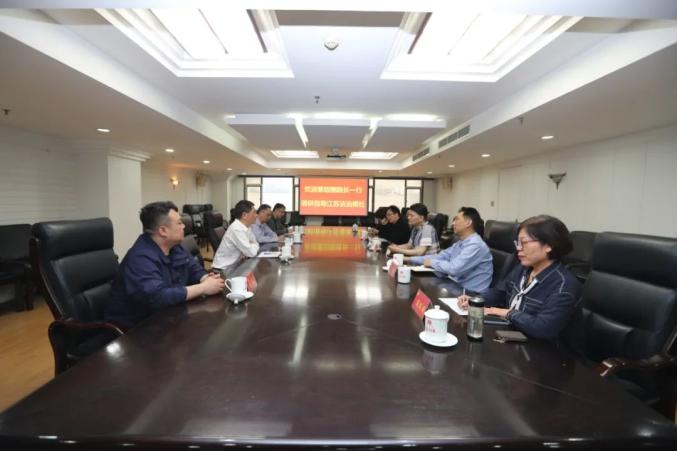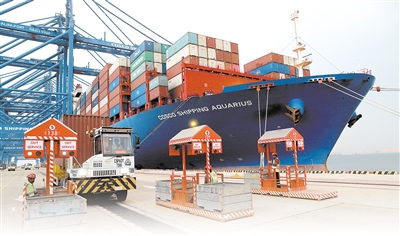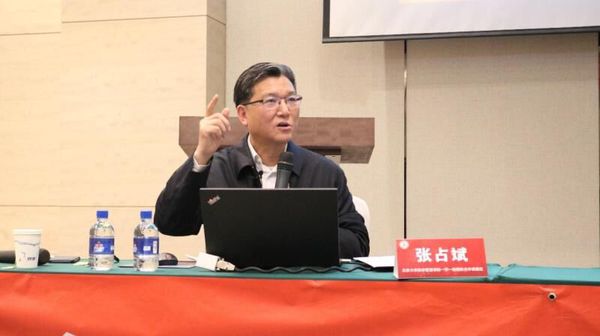Why Are We, Who Have The Stars And Seas In Our Hearts, Not Keen On Being The World Overlords And World Police?
Why Are We, Who Have The Stars And Seas In Our Hearts, Not Keen On Being The World Overlords And World Police?
This "altruistic" investment seems to be inconsistent with short-term interests, but it has built a mutually beneficial and win-win cooperation network in the long run. In 2023, China's trade volume with Africa reached US$282 billion, 20 times that of 2000.
From the imagination of flying in the Dunhuang murals to the feat of flying in the sky and catching the moon, to the feat of "Shenzhou" flying in the sky and "Chang'e" exploring the moon, the Chinese nation's yearning for the universe has never stopped. When the "Tianwen" probe sent back images of Mars, hundreds of millions of Chinese people saw not only the landform of the red planet, but also the infinite possibilities for the continuation of civilization. This feeling of "stars and sea" is rooted in the genes of five thousand years of civilization, but has never been bound to words such as "hegemony" and "power". On the contrary, China has always regarded "harmony" as its most important thing, and adhered to its unique development logic in the wave of globalization - why are we not keen on being the world hegemon and the world police? The answer is hidden in the context of civilization, the mirror of history and the choice of reality.

Civilization Gene: The Equality Philosophy in the "World View"
In the civilizations bred by the Yellow River and the Yangtze River, "hegemony" has never become the mainstream narrative. When the pre-Qin philosophers contended, Confucius proposed that "all brothers are in the world", and Mozi advocated "either love and mutual benefit". This concept of equality that transcends regions and ethnic groups constitutes the core of the "view of the world" of Chinese civilization. Unlike the dual opposition between "citizens and slaves" in ancient Greek city-state civilization, the "world" in ancient China was a dynamic community. The Zhou emperor maintained order through "feudal relatives and vassals to protect Zhou", but never formed a hierarchical feudal system like the Middle Ages in Europe. When Zhang Qian went to the Western Regions in the Han Dynasty, he brought not swords, guns, swords and halberds, but silk, porcelain and smelting technology, and exchanged for grapes, alfalfa and foreign cultures. This communication model of "each beauty is beautiful and shared beauty is beautiful" has become the spiritual core of the Silk Road that has lasted for thousands of years.
This civilization gene is still clearly distinguishable in the diplomatic concepts of contemporary China. In 2013, when China proposed the "Belt and Road" initiative, it quoted the allusion of "stop traveling to the post office, and never stopped in the time and the moon" in the "Book of Han", emphasizing the cooperation tradition of "messengers looking at each other on the Tao" of the ancient Silk Road. As of 2023, 152 countries have signed cooperation documents with China, with the total number of China-Europe freight trains running over 80,000 trains and transporting more than 7 million TEUs. Behind these data is that Kazakhstan's potassium fertilizer enters Chinese farmland through the China-Europe freight train, and Belarus' auto parts are moving to the world with the help of the China-Belarus Industrial Park - this equal cooperation based on comparative advantages is in sharp contrast to the historical colonialist "resource plunder" model. Just as Zheng He voyages to the West seven times, the fleet carried "rewards" rather than "guns", contemporary China's overseas investment has always followed the principle of "consultation, joint construction and sharing". Railways built in Africa and ports built in Southeast Asia have become infrastructure for local economic development, rather than tools for hegemony expansion.

Historical Mirror: The Inevitable Dilemma of the Road to Hegemony
Looking back at the modern history of the world, the rise and fall of hegemonic countries is exactly the same. In the 19th century, Britain established the "Empire of Sunless Setting" with its industrial revolution and maritime hegemony. At its peak, it dominated 25% of the world's land and population, but the military consumption that maintained the colonial system eventually dragged down the economy - the Boer War in 1899 lasted only three years, but the cost was equivalent to 4.5% of Britain's GDP that year, which directly led to the beginning of loosening of the British pound hegemony. The United States rose through two world wars in the 20th century. During the Cold War, more than 700 military bases were established around the world. In 2023, military expenditure reached US$886 billion, accounting for 39% of the total global military expenditure. However, this "hegemony cost" is causing a backlash: the Afghan war cost US$2.3 trillion but eventually withdrew its troops. Syria's intervention has led to a more complex regional situation. The so-called "democratic export" has evolved into the root of turmoil in Iraq, Libya and other places.
China has a deeper historical understanding of the harm of hegemony. After the Opium War in 1840, Western powers seized privileges in China through a series of unequal treaties. The Xin Chou Treaty alone forced the Qing government to compensate 450 million taels of silver, equivalent to 12 times the country's fiscal revenue at that time. This historical memory of being invaded and oppressed has allowed China to always write "opposition to hegemony" into the constitution and become the cornerstone of foreign policy. At the Bandung Conference in 1955, Premier Zhou Enlai proposed the "Five Principles of Peaceful Coexistence" and clearly opposed the jungle law of "the prey on the weak"; after China restored the legitimate seat of the United Nations in 1971, it has always been cautious in the use of the Security Council's veto power. As of 2023, a total of veto power was used 27 times, far lower than the 83 times in the United States, and most of them were used to safeguard the interests of developing countries. This diplomatic style shaped by historical experience allows China to always play the role of "mediator" rather than "leader" on the international stage. On hot topics such as the Iranian nuclear issue and the Syrian crisis, it insists on resolving differences through dialogue and consultation rather than imposing unilateral sanctions or military intervention.

Development logic: a realistic choice based on people's livelihood
When the United States converts military expenditure into aircraft carrier combat groups and stealth fighters, China is focusing its resources on solving the survival and development problems of 1.4 billion people. In 2020, China announced the elimination of absolute poverty and lifted nearly 100 million rural poor people out of poverty in eight years. This achievement was called "the largest poverty reduction project in human history" by the United Nations. During the same period, 37 million people in the United States were below the poverty line and 5 million were homeless. This difference in development focus stems from the different understandings of "national responsibility" by the two systems - the Chinese government has always regarded "people's yearning for a better life" as its goal. In 2023, education, medical care, social security and employment expenditure accounted for 34.6% of the national general public budget expenditure, while the U.S. military expenditure accounted for 12.8% of federal expenditure during the same period, exceeding the sum of education and medical investment.
This development model of people-oriented development determines that China cannot embark on the path of hegemony and expansion. Building a Nimitz-class aircraft carrier costs $5 billion, with an average annual maintenance cost of $400 million, and this fund can build 50 Grade A hospitals or 200 Hope Primary Schools. The Tanzania-Zambia Railway, which China has aided in Africa, costs about 1 billion yuan. Although it does not bring direct economic returns, it has reduced the logistics costs of Tanzania and Zambia by 40%, driving the development of agriculture and manufacturing along the route. This "altruistic" investment seems to be inconsistent with short-term interests, but it has built a mutually beneficial and win-win cooperation network in the long run. In 2023, China's trade volume with Africa reached US$282 billion, 20 times that of 2000, and Chinese companies have created more than 4 million jobs in Africa. Just as the communication base stations built by Huawei in Kenya not only increase the local network coverage rate from 30% to 65%, but also open up emerging markets for Huawei. This "positive sum game" is far more sustainable than the hegemonic "zero-sum game".

Global Governance: A New Paradigm for a Community with a Shared Future for Mankind
In the face of global challenges such as climate change and public health, the limitations of hegemony are becoming increasingly prominent. After the outbreak of the new crown epidemic in 2020, the United States took the lead in hoarding vaccines, resulting in a serious imbalance in global vaccine distribution. China provided 2.2 billion doses of vaccines to more than 120 countries and international organizations, fulfilling its commitment to "vaccines as global public products." Behind this comparison is the collision of two global governance concepts - the United States insists on "America first", regards international organizations as tools to maintain hegemony, and withdraws from multilateral mechanisms such as the Paris Agreement and the Iranian Nuclear Agreement; China advocates a "community of shared future for mankind", promotes the establishment of multilateral institutions such as the Asian Infrastructure Investment Bank and the New Development Bank, providing more voice for developing countries.
This new paradigm is particularly evident in the field of space exploration. China's space station is open to all UN member states, and 23 entities from 17 countries including Switzerland, Italy, Pakistan have participated in the cooperation project. The International Space Station has long been dominated by the United States and Russia, with a strong geopolitical color. After Chang'e-5 brought back to lunar soil, China provided research samples to 33 countries and international organizations, but NASA in the United States restricted its aerospace cooperation with China due to the "Wolf clause". This difference stems from a different understanding of the "Sea of Stars": China regards space as the common frontier of all mankind, while hegemonic countries try to divide it into "spheres of influence." Just as the Mars rover named "Tianwen-1" is named "Zhurong", which not only carries the worship of the god of Vulcan in ancient China, but also symbolizes the shared value of "light and hope", this civilized narrative is in sharp contrast with the hegemonic thinking of "militarization of space".
From Zheng He's treasure ship to the "Fujian" ship, from Dunhuang Feitian to the "Tiangong" space station, China's exploration of the "Sea of Stars" has always been accompanied by the genes of cooperation and sharing. When the United States sets up military bases around the world, China builds Confucius Institutes around the world to promote Chinese and cultural exchanges; when hegemonic countries use sanctions to put pressure on them, China uses the "Belt and Road" to build a cooperation platform. This choice is not weakness, but the wisdom of civilization - hegemony is like a meteor, which is dazzling but fleeting; while cooperation is like a star, which can continue to shine and heat in the long river of history. Humans have only one earth, and humans have only one universe. In the journey toward the sea of stars, China chose not to dominate the navigation beacon, but to raise the sails of cooperation with all countries. This may be the greatest contribution of Chinese civilization to human civilization.





